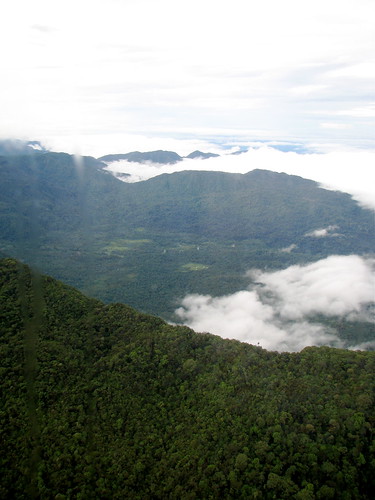 |
| kabl1992's photostream via Flickr |
The flat bed truck grumbled as it crawled up the mountainside. It knew the way well and wasn’t happy to be doing it all over again. Once a day was enough. More was cruel. Like an ornery old man it sputtered and hissed, stumbling on rocks the size of melons and creaking out in despair at the surefire pain that lay ahead. The drive from Tari to Komo in the Southern Highlands of Papua New Guinea, a land known as the Last Frontier and boasting its fair share of present day cannibals was long and treacherous, hot and bumpy, and as tiring for the driven as the drove. I looked down at my Teva-laden feet already covered in a thin film of dirt. It was going to be a long afternoon.
Most days the trip would take anywhere from four to six hours depending on the number of bridges we’d have to make. But that was knowledge I didn’t yet know. It was my first day, my first ride, my first sightings of the area I would call home. And it was incredible.
The broccoli-topped trees were carpeted with cloudy mist. Horn Bills and Birds of Paradise echoed in the distance. I breathed in the scent of sweet grass and native sweat both swamped in humidity so thick my clothes hung like damp rags. Banana trees, orchids, fruits I had never before met...what was that? I pointed and screeched as a whampadee animal loped across the road. The driver shrugged. I unscrewed the top of my water bottle to gulp in a big swig, pouring more into my lap than into my mouth. I had never driven on such a bumpy road before. But look at that view. And smell those exotic scents. Am I dreaming? Let me stay if I am. Oh, let me stay!
The Southern Highlands was an area completely unknown to the outside world until the 1940’s when a small group of Australians decided to take an extended hike. I was going to live amidst the Huli, the second largest tribe in the country with a language that had never been written down. They were a people who saw their first wheel on the underside of an airplane, who would weep for me when they heard my people have to work for food, and who would laugh at me when they saw my attempt to keep time on my wrist.
My head was starting to ache. It had been hours since I sipped my last drop and still the sun blazed down on my freckled cheeks. We had made four bridges with the heavy logs carted along for exactly that purpose, and we were tired. I sighed.
“Not much left. You will hear. Listen,” he said to me, as we neared my new home.
And like a prophecy, it was true.
The sound emerged like a low chant rising as we neared, not stopping but rising, rising, rising still higher until the crowd sounded as if it were crying a unified, high pitched wail. As we came to a stop, they moved closer and closer, tightening their seams, elbow to elbow, bilum to bilum*, wig to wig.** My eyes stared transfixed. My heart beat wildly. They were natives. They were real natives. And not just in a National Geographic magazine, but in person. And they knew I was arriving. They were waiting for me. They cared. I could feel their emotion, their anticipation, their enthusiasm.
 |
| Rita Willaert's phtostream via Flickr |
When I got down from that aged old flat bed to meet the people of my new home that day in September of 1995, I soon realized I would never be the same. A sea of people enveloped me, tightening around me as if I were the last drop of water on a parched earth, every person aching to touch the novelty, the reincarnated ancestor, the young woman with the straight hair of an angel. They kneaded me like bread, my calves, my forearms, my cheeks and back. They cried out like only Huli natives can—in high-pitched song expressing their heartfelt, excitement-driven emotion. I reached out to touch back, to care back, to connect. They guided my hands to their faces, to their hair, to their arms and leather-worn hands. I looked up and into their sparkling eyes, all of us a mess of tears. You, too? they said, over and over again in every face I saw.
You, too?
You, too??
You, too???
YES! Me, too!
I may look different but yes, I weep from the very same heart.
(*) the woven bags Huli women wear hanging from their heads
(**) the Huli men are famous for their wigs










2 comments:
What a beautiful post! Thank you, Brynne. All different, but with the same heart.
Thanks, Muriel...and you know this better than many, don't you, living in a country other than where you were raised.:) Hope all is well! Love finding you here, sweet friend!
Post a Comment